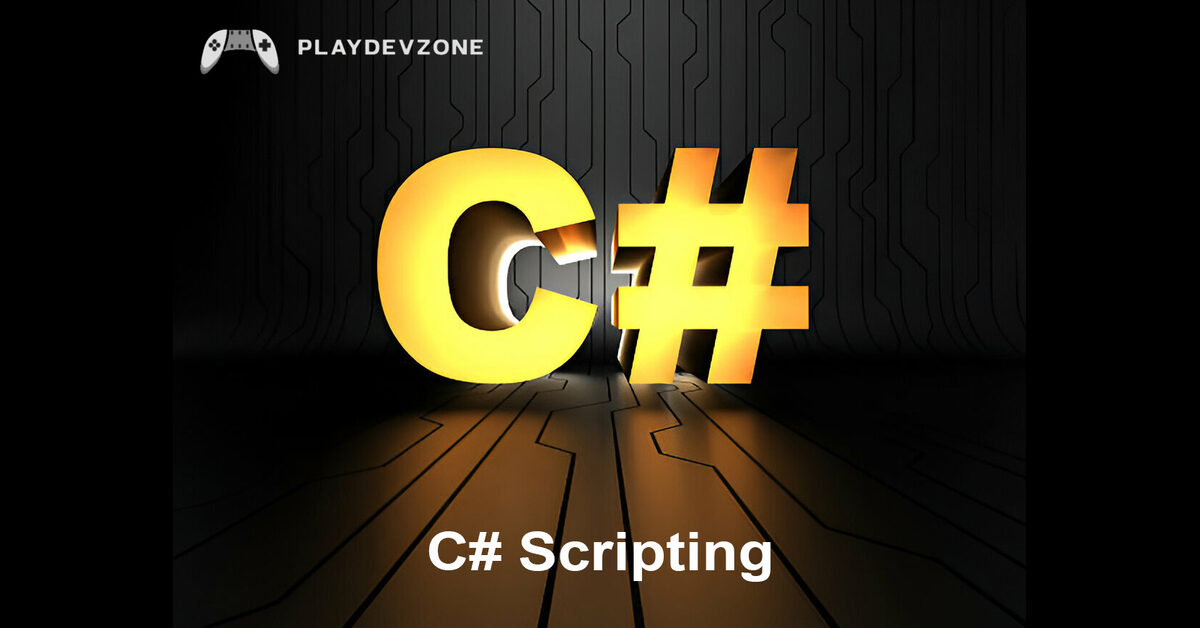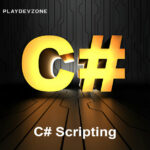In the world of software and game development, C# scripting stands out as a powerful and beginner-friendly way to bring logic and interactivity into your applications.
Whether you’re building games with Unity or developing standalone apps, mastering C# scripting opens the door to endless creative possibilities.
In this guide, we’ll explore what C# scripting is, how it works, and why it’s such a vital skill for modern developers.
What is C# Scripting?
C# scripting is the process of writing short, task-specific code using the C# programming language to control behaviour in applications, games, or systems.
Unlike traditional compiled programs, scripts are often run at runtime, making them ideal for quick development and testing.
Widely used in game engines like Unity, C# scripting allows developers to define how game objects move, interact, and respond to player inputs.
It supports object-oriented programming, making code more modular and reusable.
Whether you're automating tasks, creating game mechanics, or building interactive software, C# scripting offers a flexible and beginner-friendly entry point into programming.
Its clean syntax, strong community support, and integration with powerful development tools make it a top choice for developers in both the gaming and software industries.
Why Learn C# Scripting?
Learning C# scripting opens the door to a wide range of opportunities in game development, software automation, and application programming. It's the primary language used in Unity, one of the world’s most popular game engines, making it essential for aspiring game developers.
With its clean, readable syntax and strong support for object-oriented programming, C# is beginner-friendly yet powerful enough for advanced projects.
Whether you're building interactive games, automating repetitive tasks, or developing scalable desktop applications, C# scripting provides the flexibility and performance you need.
It’s also highly in demand across industries, with a strong job market and an active developer community.
By learning C# scripting, you're investing in a skill that's both practical and future-proof.
Tools You Need to Get Started
Getting started with C# scripting is simple, but using the right tools can make your learning experience smoother and more efficient.
First, install Visual Studio or Visual Studio Code; both are excellent IDEs that support C# syntax highlighting, debugging, and IntelliSense.
If you're interested in game development, download the Unity Engine, which uses C# as its primary scripting language.
For general application development, the .NET SDK is essential, enabling you to build and run C# applications locally.
You can also use Git for version control and NuGet for managing libraries and packages.
These tools collectively provide a powerful environment for writing, testing, and managing your C# scripts, whether you're building games, automating workflows, or developing desktop apps.
Core Concepts in C# Scripting
To master C# scripting, understanding the core concepts is essential.
At the foundation are variables and data types like int, float, string, and bool, which store and manage data. Methods (or functions) allow you to group reusable code for specific tasks.
Conditional statements such as if, else, and switch enable decision-making based on dynamic input or game states.
Loops, such as for, while, and foreach, help automate repetitive tasks.
Object-oriented programming (OOP) is another key concept, allowing you to organise code using classes, inheritance, and encapsulation.
These principles make your scripts more scalable and easier to manage.
Whether you're scripting in Unity or building desktop applications, a firm grasp of these fundamentals will make your C# scripts more powerful, efficient, and error-free.
Writing Your First C# Script
Creating your first C# script marks an exciting introduction to the world of coding and interactive development.
It's the first hands-on step toward building real functionality, whether in software applications or game environments.
Start by setting up a development environment like Visual Studio or Visual Studio Code, which offer helpful features such as syntax highlighting and debugging tools.
Begin with a simple script, such as displaying a message or controlling an object’s movement in Unity.
A basic "Hello World" script helps you understand how C# syntax works, including variables, methods, and the Main() function.
In Unity, scripts are attached to GameObjects, where methods like Start() and Update() control game behaviour.
By writing your first script, you learn how to translate ideas into interactive code, laying the foundation for more complex projects.
With practice, C# scripting becomes a powerful tool to bring your creative visions to life.
Real-World Applications of C# Scripting
C# scripting has a wide range of real-world applications across various industries.
In game development, it’s the backbone of gameplay logic, physics, and AI in Unity-based projects.
Beyond gaming, C# scripting is widely used in desktop application development using the .NET framework, allowing developers to automate tasks, build tools, and create user-friendly interfaces.
In the enterprise world, C# scripts help with data processing, backend automation, and system integrations.
It's also used in web development with ASP.NET, enabling dynamic, server-side functionality.
Whether you're building interactive games, automating workflows, or developing scalable software solutions, C# scripting offers flexibility, speed, and efficiency.
Its versatility and strong community support make it a go-to choice for both beginners and professionals in tech.
FAQ (Frequently Asked Questions)
Is C# used for scripting?
Yes, C# is widely used for scripting, especially in environments like Unity, where it serves as the primary language for controlling game behaviour, interactions, and logic.
While C# is traditionally known as a compiled programming language used in full-scale application development, it also excels in scripting scenarios where modular, event-driven, or task-specific code is needed.
In game development, C# scripts are attached to objects to manage movement, user input, physics, animations, and more.
Beyond gaming, C# scripting is used in automation tools, desktop applications, and back-end services within the .NET ecosystem.
Its clean syntax, robust features, and integration with modern development tools make it a strong and accessible scripting language for both beginners and experienced developers.
How to write a C# Script in Unity?
To write a C# script in Unity, start by opening your project and navigating to the Assets panel. Right-click, then select Create > C# Script, and give it a meaningful name.
Unity will generate a script file with a default class and two methods: Start() for initialisation and Update() for frame-by-frame logic.
Double-click the script to open it in Visual Studio or another compatible code editor. Inside, you can declare variables, write custom methods, and define behaviour using Unity's API.
Once your code is ready, simply drag and drop the script onto a GameObject in the scene to make it functional.
This approach allows you to build game mechanics, handle user input, control animations, and more, all with clean, event-driven C# code.
Is C# a programming language or a scripting language?
C# is a programming language, not a scripting language.
Developed by Microsoft, C# (pronounced "C-sharp") is a statically typed, object-oriented language designed for building robust, scalable applications, particularly on the .NET platform.
Unlike scripting languages, which are typically interpreted and used for automating tasks or web development (e.g., JavaScript or Python in scripting contexts), C# is compiled into intermediate language (IL) and run by the Common Language Runtime (CLR).
This gives it better performance and stronger type safety. C# is used for developing desktop applications, web services, cloud-based solutions, mobile apps (via Xamarin), and games (via Unity).
Its rich standard library, modern syntax, and support for asynchronous programming and generics further establish it as a full-fledged, high-level programming language suitable for enterprise-grade development.
Is C# a backend or frontend language?
C# is primarily a backend programming language. It is widely used for building server-side applications, APIs, and business logic using the .NET Framework.
In web development, C# powers backend technologies like ASP.NET Core, enabling developers to handle database operations, authentication, server-side rendering, and other crucial backend functions.
While C# can be used in frontend scenarios such as with Blazor, which allows C# to run in the browser via WebAssembly, its core strength lies in backend development.
It is also popular in desktop application development (using WPF or WinForms) and game development with Unity.
Though not traditionally used for frontend tasks like HTML, CSS, or JavaScript, C# can complement frontend development by efficiently managing server-side operations, ensuring smooth interaction between the client and the server.
Is C# .NET full stack?
C# can be a key part of a full-stack development environment when used with the .NET ecosystem.
While C# itself is primarily a backend language, the .NET platform supports full-stack development. Using ASP.NET Core for backend logic and Blazor for frontend web development, developers can build both client-side and server-side applications entirely in C#.
This allows for a seamless, unified technology stack where both the frontend and backend share the same language, improving productivity and maintainability.
Additionally, C# with .NET supports database access through Entity Framework, API creation, and modern web standards.
While it’s not traditionally full-stack on its own, when combined with the tools and frameworks within .NET, C# becomes a powerful full-stack solution, suitable for building scalable web applications without switching to JavaScript or other frontend-specific languages.











